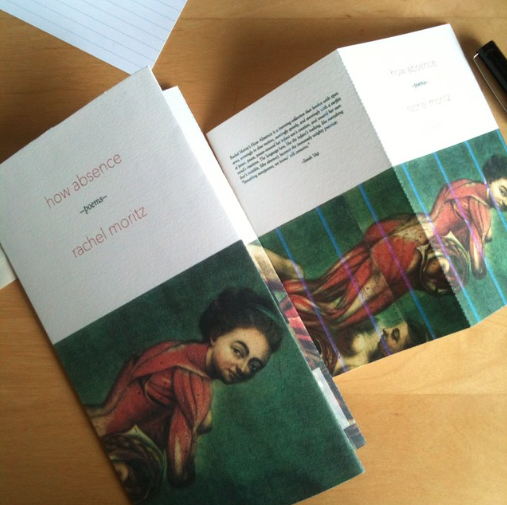How Absence by Rachel Moritz
– Reviewed by Grant Tarbard –
Rachel Moritz is the author of five poetry chapbooks, including How Absence, published by the excellent MIEL Books. To quote Daniel Sluman, “absence has a weight”, and this collection has weight. Moritz crafts a delicate meditation on childbirth as a conception of art, and on the emptiness after any act of creation. Refreshingly, this is not done with brute force: Moritz’s light touch hoists through milk with electricity. The word alembic, an alchemical consisting of two vessels connected by a tube, crops up frequently, and would be a fine description of this book.
The first poem owes a debt to Sarah Vap’s poems ‘Meditation on Pink’ and ‘Fallopian’. ‘First Alembic (Before)’ is a toothsome love poem in bloom, but the everyday repeats on a transient axis with something just out of view, out of reach:
On the lilac, buds sharpen-
a quotidian green spring
and
nothing new
but these windows with our names
Grace with molars, beautiful and dealing with the invisible:
something transparent
still contains.
Up next is ’Near Future’, which dips its hands into sound. I can feel the poet’s smile behind the structure of the lines: a crooked house of a poem. The poet isn’t hiding away her love, but it isn’t saccharine at all:
as if the outer forms
of thingswere merely
elevations
These lines are grand. Elevation means being raised to a higher level, state, or position, so what does “merely” mean in this context? I think it means that it’s not how you look, it’s how you feel, with “the outer” being disregarded for the inner being.
This collection has a sprinkling of Ancient Greek skipping stones. In Ancient Greek, Kairos is a moment of indeterminate time in which everything happens. ‘Kairos (Conception)’, the second poem under Vap’s influence, is perfectly titled, for conception is just that; an indeterminate time in which everything happens, from the hesitant foreplay of:
The light from her hand, the door
flashing, delicacy
of accepting on faith that we
are complete by anyone’s standards
to the invisible tug of a named amniotic sac in a mother’s womb, wonderfully rendered:
yoked to someone
with a name
A man cannot know this feeling, but Moritz explains it so adeptly that I can get a sense of the other, inner, world. A baby is invisible for nine months but present in the mother’s body, in the physical changes that pregnancy brings about, and in the mother’s mind, sudden and dramatic increases in oestrogen and progesterone creating the “glow” of pregnancy.
In ‘Nativity’ the day of birth “arrived, ambivalent” drenched in rain. The poet prizes apart the act:
You resembled in my mind a person
formed of me, more clone
than creation
There is a silence behind all things, always dark after the unexpected hysteria:
sorrow trembled,
and I could see its face panthering, its bruted silence
Childbirth is a gruesome duel of gore and awe, of the mother’s inner flesh and impending foreign steel implements not of the body:
Speculum distended
its alligator jaw
Finally a flood of reverence, the refinement of the release:
my palm so like a cradle
left me breathless.
‘All kinds of alembics’ is an ode to in vitro fertilisation, “the child made of science”, divided by a line with a mesh of notes below. It is a spirited poem, a keystone of sorts, with lines such as:
the child made of art in a cloudless bottle
‘Milk, Milia’ continues this other-worldliness, or inner-worldliness, describing a dream of a sonogram, “my father’s horse / in transulencent sack”. This leads on to the superbly constructed line “if I write a letter as wordless as his color was”, the colour of translucence.
Animality is ever present, but the poet doesn’t feel superior, she feels at one, albeit slightly skewed, telling us
how humility of every kind
rose from the animal lawn
Emily Dickinson is quoted in ‘His Sweet Velocity’, a title taken from Dickinson’s letter of condolence to her sister following the death of her nephew Gib from typhoid fever; he was just eight years old. Dickinson wrote: “I see him in the Star, and meet his sweet velocity in everything that flies—”
There is a glimpse into Moritz’s life of “weeds and bike wheels” and a discussion of the disquiet of mortality, “like a body filled and emptied.”
I read ’Dear Cronus’ with a heavy heart. In myth, Cronus devoured his children, but Moritz uses Cronus as Father Time (Chronos), a healer perhaps?
You were benevolent with my boy
when his lung collapsed
This collection is full of love, a blooming dahlia of arms that quietly embraces you: at times a discussion between the poet and the invisible, at times a thriller. The first time I read it was at night, and it reminded me a little of Cormac Mccarthy’s The Road, in that you feel for mother and child and have a sense of unease about their well being. When the air goes out of Moritz’s child you yourself deflate, then breathe with the rise and fall of Moritz’s words, the beautifully crafted heartache of a vessel emptied and refilled.





